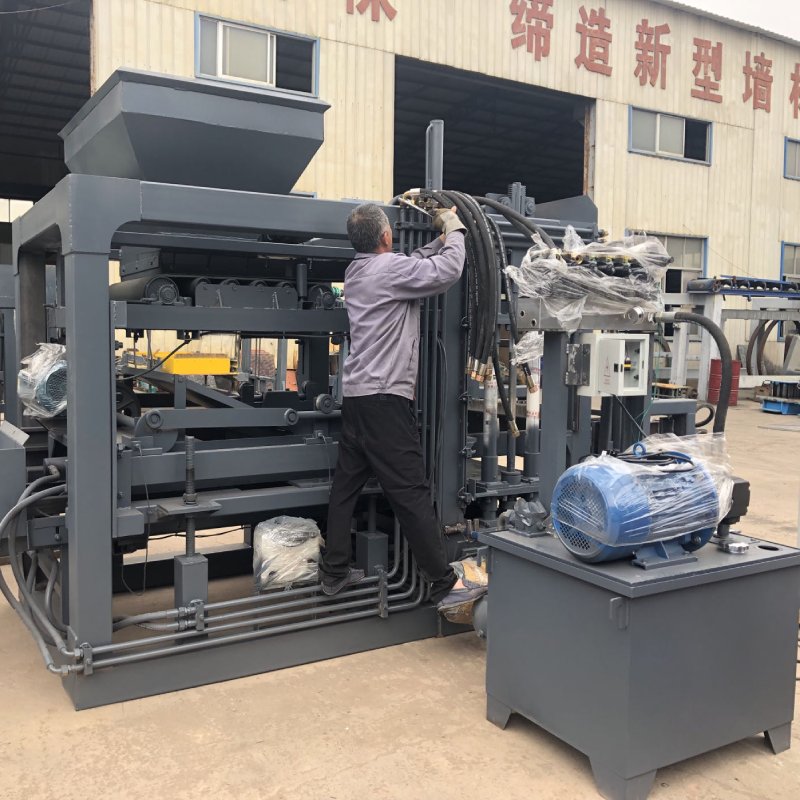
Image source Aiwei block machine
Introduction
In the rapidly evolving world of construction, automation and robotics have become key drivers of efficiency and productivity. One remarkable innovation in this realm is the next-generation robotic brick block maker. This article explores the features, benefits, and impact of these cutting-edge machines in revolutionizing the construction industry. By harnessing the power of robotics, these advanced systems streamline production, enhance precision, and offer new possibilities for construction projects.
Understanding the Next-Generation Robotic Brick Block Maker
The next-generation robotic brick block maker represents a significant leap forward in construction technology. These machines utilize robotics, artificial intelligence, and advanced automation systems to automate the process of brick and block production. Equipped with precise sensors, computer vision capabilities, and robotic arms, these machines can handle various tasks, including material handling, mixing, molding, and stacking.
Advantages and Benefits
The next-generation robotic brick block makers offer numerous advantages and benefits, making them an invaluable asset in construction projects. Let’s explore some key advantages:
- Increased Production Efficiency: Robotic brick block makers significantly enhance production efficiency by automating repetitive and labor-intensive tasks. With their high-speed operations and accurate material handling capabilities, these machines can produce a large number of bricks or blocks in a shorter timeframe compared to traditional methods.
- Improved Precision and Quality Control: The integration of advanced sensors and computer vision technology enables robotic brick block makers to achieve precise and consistent results. These machines can accurately measure and control the composition of raw materials, ensuring uniformity and quality in the produced bricks or blocks. The elimination of human error enhances the structural integrity and overall durability of the final construction.
- Enhanced Safety on Construction Sites: By automating manual tasks, robotic brick block makers minimize the risk of injuries associated with repetitive and physically demanding work. This enhances safety on construction sites, creating a more secure working environment for laborers and reducing the occurrence of accidents.
- Flexibility and Customization: Next-generation robotic brick block makers offer flexibility in terms of design and customization. With their advanced programming capabilities, these machines can produce bricks or blocks in various sizes, shapes, and patterns, catering to the unique architectural requirements of different construction projects.
- Time Efficiency and Project Acceleration: The advanced automation and high-speed operations of robotic brick block makers significantly reduce construction timelines. By accelerating the production process, these machines contribute to faster project completion, helping construction companies meet deadlines and potentially reducing costs associated with extended project durations.
- Resource Optimization and Sustainability: Robotic brick block makers optimize the use of resources by precisely controlling the amount of raw materials required for each brick or block. This reduces waste and minimizes the environmental impact associated with excessive material consumption. Additionally, the use of automated systems in construction aligns with sustainability goals by conserving energy and reducing carbon emissions.
- Skill Development and Workforce Integration: While robotic brick block makers automate many aspects of production, they still require skilled operators and technicians for setup, maintenance, and troubleshooting. This presents opportunities for skill development and integration of the workforce, as operators learn to work alongside robotic systems and leverage their capabilities.
.
Impact on the Construction Industry
The introduction of next-generation robotic brick block makers has a profound impact on the construction industry, transforming construction practices, productivity, and sustainability. Let’s explore the key impacts:
- Increased Construction Speed and Productivity: Robotic brick block makers streamline the production process, leading to increased construction speed and productivity. These machines can work continuously without breaks, allowing for round-the-clock production and faster project completion.
- Precision and Consistency in Brick and Block Production: The advanced sensors and computer vision technology of robotic systems ensure precise measurements and consistent quality control. This leads to the production of uniform bricks or blocks, minimizing defects and enhancing the overall strength and durability of the constructed buildings.
- Construction Cost Optimization: The enhanced efficiency and precision offered by robotic brick block makers contribute to cost optimization in construction projects. The reduction in labor requirements, waste materials, and rework leads to cost savings and improved profitability for construction companies.
- Advancement in Building Design and Architecture: Robotic systems offer flexibility in creating complex designs and architectural patterns. With their ability to handle intricate tasks and produce customized bricks or blocks, these machines enable architects and designers to explore new possibilities in building design and push the boundaries of creativity.
- Workforce Transformation and Reskilling: The integration of robotic brick block makers requires a shift in the workforce composition and skill sets. As automation takes over repetitive tasks, workers can be trained and reskilled for more sophisticated roles, such as machine programming, maintenance, and quality assurance. This promotes workforce transformation and supports the development of new skills in the construction industry.
Conclusion
The next-generation robotic brick block maker represents a significant milestone in the construction industry’s journey toward automation and robotics. With their advanced technology, these machines bring higher production efficiency, improved precision, and enhanced safety to construction sites. They offer numerous advantages, including increased construction speed, optimized resource utilization, and customized design capabilities.
While robotic systems may not entirely replace human labor, they reshape the roles and responsibilities of construction workers, creating new opportunities for skill development and workforce integration. Embracing this technological advancement allows construction companies to stay competitive, improve project timelines, and deliver high-quality buildings.
As the construction industry continues to evolve, the next-generation robotic brick block maker will play a vital role in shaping the future of construction, driving innovation, and pushing the boundaries of efficiency and sustainability.
